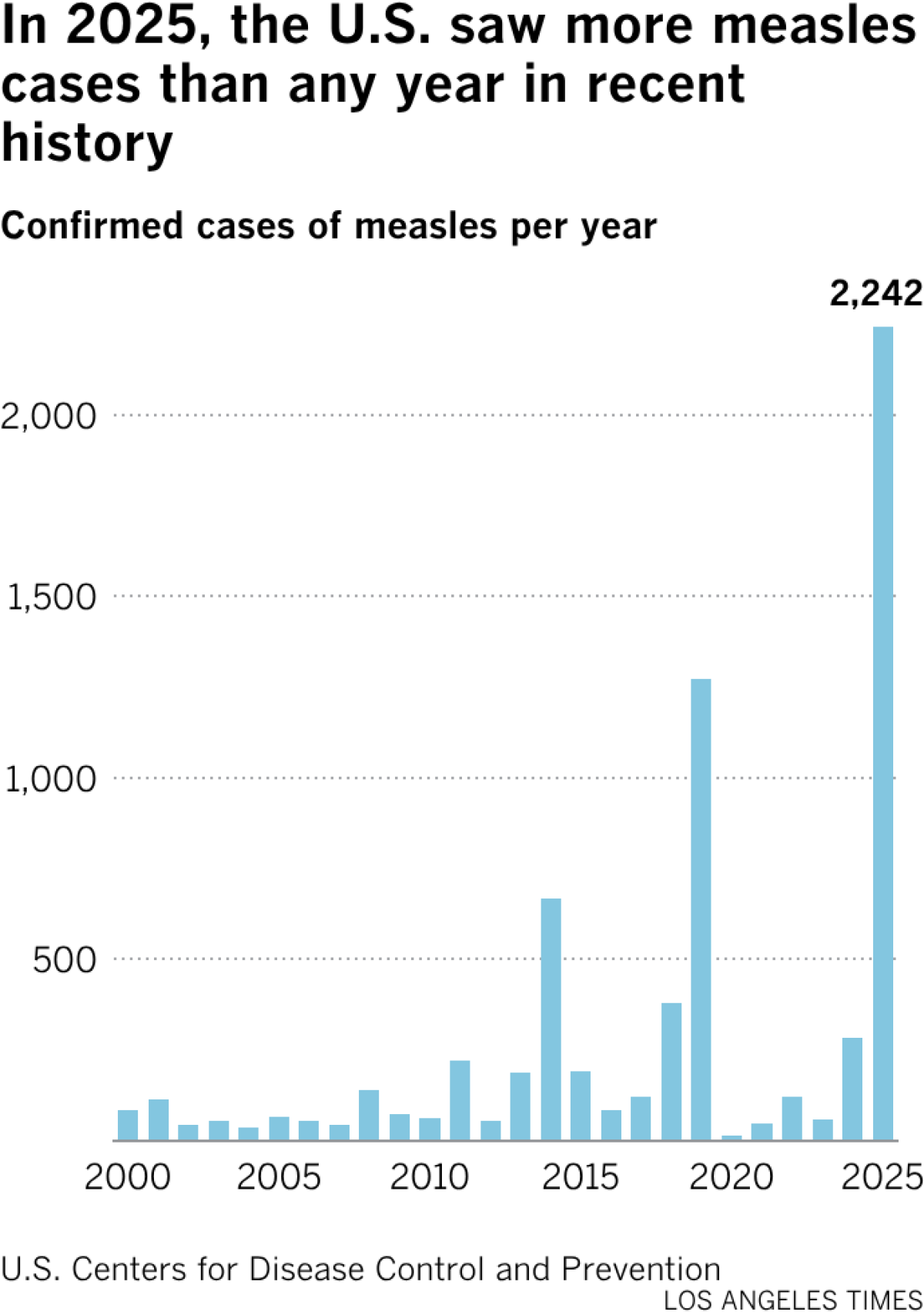Measles resurgence puts the U.S. at risk of losing its ‘elimination’ status
One year ago this week, a case of measles was recorded in Gaines County, Texas.
It was the start of an outbreak that killed two children and sickened at least 760 people. Thousands more in the U.S. have contracted measles since.
In April, the Pan American Health Organization, an offshoot of the World Health Organization, will determine whether the same virus strain first recorded in west Texas on Jan. 20, 2025, has been transmitted without interruption in the 12 months since.
If it has, the U.S. will officially lose the measles elimination status that the organization conferred in 2000.
Meeting those requirements “took several decades of really hard work,” said Dr. John Swartzberg, an infectious disease specialist and emeritus professor at UC Berkeley. “Losing that distinction is an embarrassment for the United States. It’s another nail in the coffin for the credibility of this country.”
In public health terms, elimination means that a disease has become rare enough, and immunity to it widespread enough, that local transmission dwindles quickly if a case or two emerges.
Scientists from the U.S. Centers for Disease Control are studying virus sequences from multiple sites around the U.S. to determine whether more recent measles cases are descended from the original outbreak or were introduced from other locations, a distinction that could affect whether the U.S. keeps its status.
Regardless of the international committee’s ultimate ruling, what is clear is that a highly contagious, vaccine-preventable disease kept largely in check for a quarter of a century is surging back.
There were 4,485 confirmed measles cases in the U.S. between Jan. 1, 2000, and Dec. 31, 2024, according to the Centers for Disease Control. In 2025 alone, there were 2,242 — the highest annual case count since the early 1990s.

“Measles is incredibly contagious, and it is the thing that comes first when you take your foot off the gas, in terms of trying to keep vaccination levels up,” said Dr. Adam Ratner, a New York-based pediatric infectious disease specialist and author of the book “Booster Shots: The Urgent Lessons of Measles and the Uncertain Future of Children’s Health.”
“It didn’t have to turn out this way,” he said. “It doesn’t help us that there haven’t been clear messages from HHS.”
In March, after the first child death from measles in more than a decade in the U.S., Health and Human Services Secretary Robert F. Kennedy Jr. issued a statement that noted vaccines’ effectiveness in preventing measles’ spread, but stopped short of outright recommending that parents vaccinate their children.
A month later, he posted on X: “The most effective way to prevent the spread of measles is the MMR vaccine,” outraging many of his anti-vaccine supporters.
Yet as the year went on, Kennedy and the agencies he leads upended the nation’s vaccine delivery system, while publicly sharing misleading and inaccurate information about immunizations.
Kennedy dismissed the members of a key vaccine advisory committee to the CDC and replaced them all with handpicked appointees, many of whom have been openly critical of vaccines or have spread medical misinformation.
Late last year, the CDC altered its website on vaccines and autism to include inaccurate statements linking immunizations to the neurodevelopmental disorder. Earlier this month, the CDC abruptly slashed the number of diseases it recommends children be vaccinated against from 17 to 11.
While the CDC has not officially changed MMR vaccine recommendations, the agency’s conflicting actions and confusing statements have only further depressed vaccination rates, experts said.
“The messages that are coming out of this CDC are crazy. It’s hard for pediatricians. It’s hard for parents,” Ratner said. “Nothing has changed about how safe the MMR vaccines are … or how well they work. It is all the messaging. And I’m very concerned that that is speeding up, not slowing down.”
Vaccination rates in the U.S. were already dipping before Kennedy’s appointment to Health and Human Services. Only 10 U.S. states — including California — meet the 95% vaccination threshold required to prevent community transmission of measles.
Forty-five states reported confirmed measles cases last year, and at least nine states have logged cases in January alone.
“If you go to cdc.gov, you would expect to see a huge banner saying, ‘Measles outbreak, get your vaccine now,’” said Dr. Jeff Goad, a Chapman University School of Pharmacy professor and president of the National Foundation for Infectious Diseases. “And it’s not there.”
The Pan American Health Organization will review data from the U.S. and Mexico on April 13 to determine whether those two countries will endure the same fate as Canada, which lost its measles elimination status in November.
“Whether or not we officially lose elimination status is an academic exercise at this point,” said Mathew Kiang, an assistant professor of epidemiology and population health at Stanford University. “The reality is that without concentrated efforts to ramp up vaccination, we will continue to have these long, extended outbreaks across the U.S. We’re witnessing the results of a years-long effort to disassemble the vaccine infrastructure in the U.S. that has been accelerated by the current administration.”
